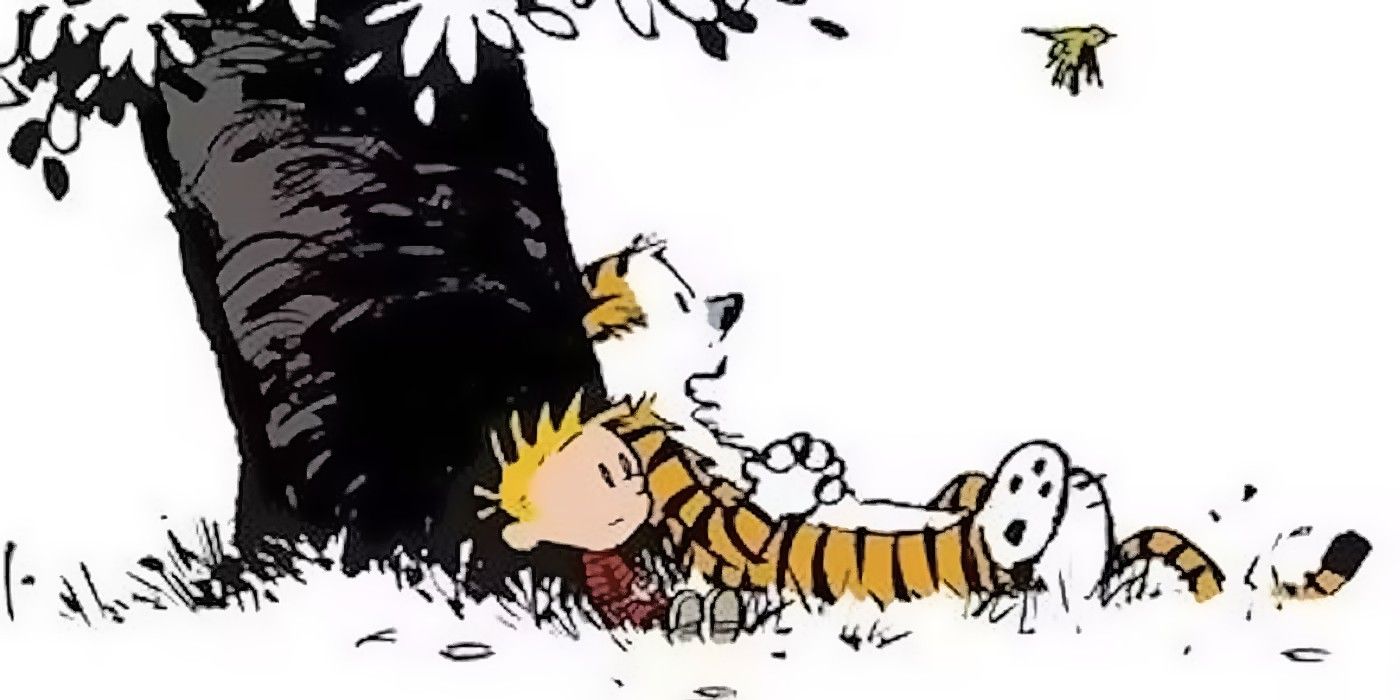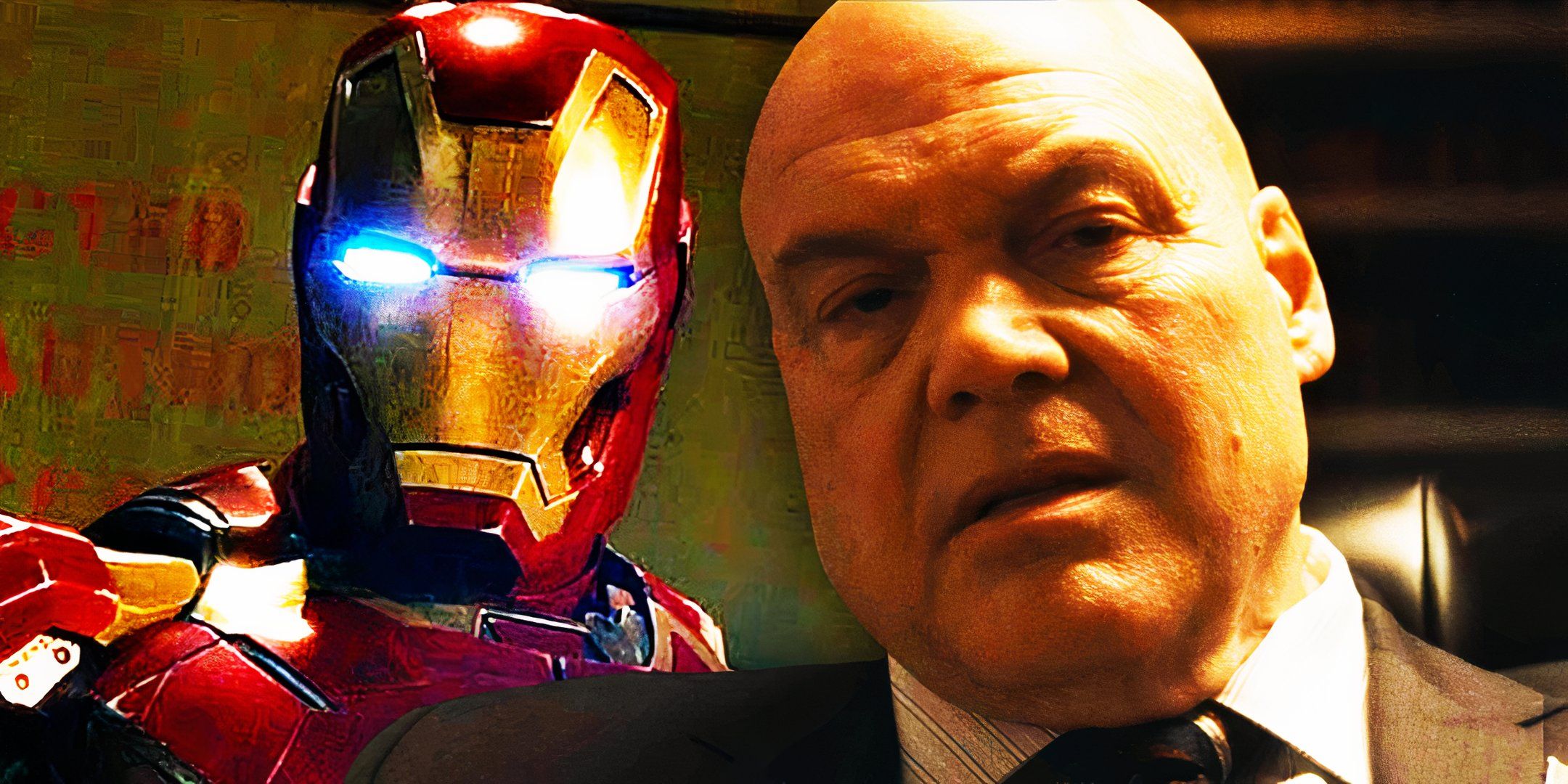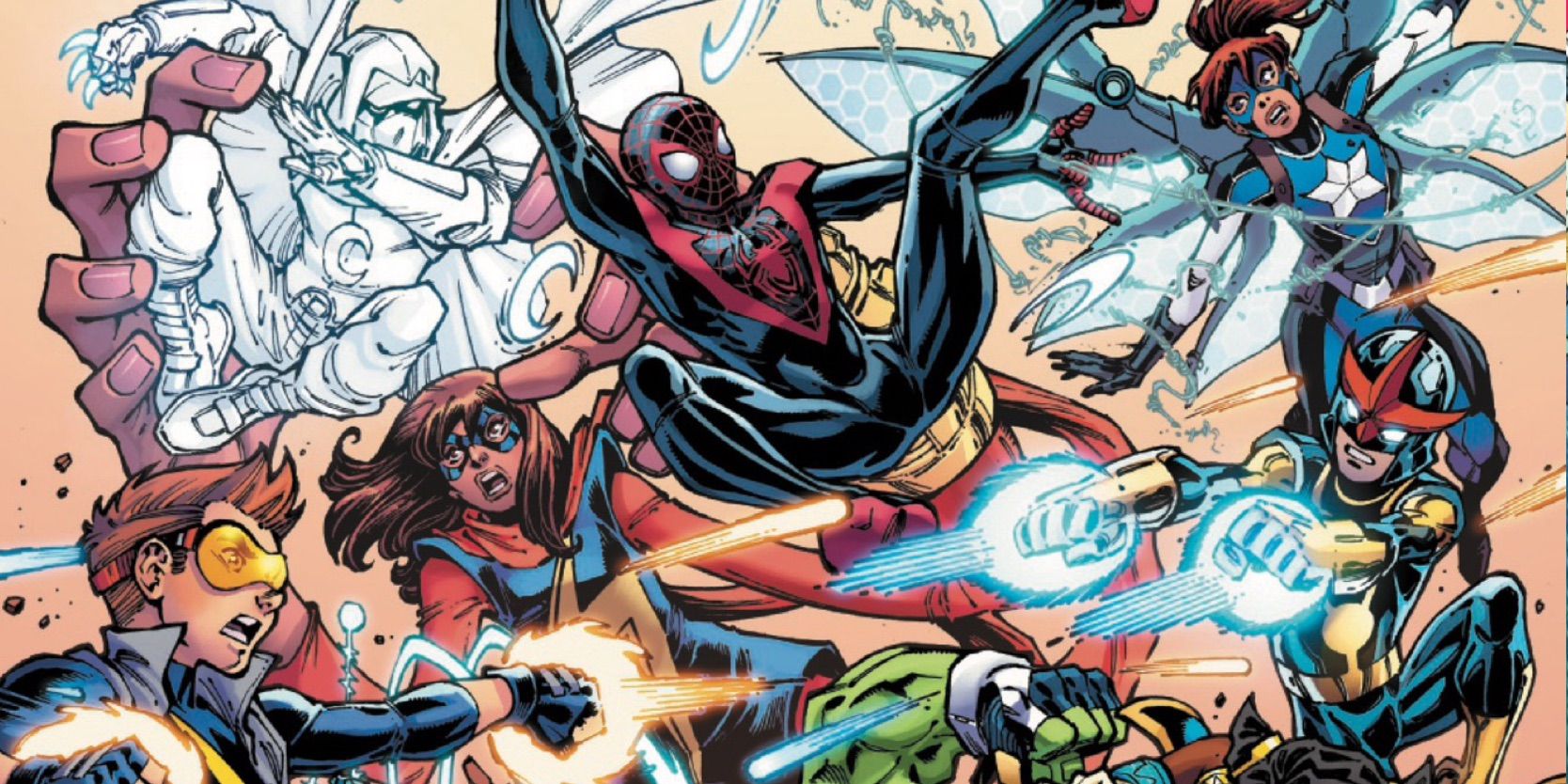10 Most Philosophical Moments in Calvin and Hobbes Comics
Summary Calvin and Hobbes often delved into profound philosophical discussions through the whimsical interactions of its protagonists.
Bill Watterson's comic offered equal parts humor and deep reflections on life, existence, often bringing the moral quandaries of being human to the forefront of the strip's humor.
Through the characters of Calvin and Hobbes, Watterson tackled big questions about human nature, morality, and the purpose of life, doing it all with wit and wisdom.
Calvin and Hobbes was more than just an amusing comic strip; it was often a philosophical masterpiece. Following Calvin, a ten-year-old boy, and his stuffed tiger Hobbes, who he brings to life through his imagination, the comic strip has practically everything a casual comic fan could want: adventure, comedy, and even occasional tragedy. Through it all, the humor of the series was always tinged with thoughtful reflections on existence.
Bill Watterson, the creator of Calvin and Hobbes, was a philosopher himself, who chose the comic book medium – and a child as his main character – as the forum through which he would engage with many of the greatest philosophical theories in history.
Original Calvin and Hobbes Books with all Strips Title Release Date Strips The Essential Calvin and Hobbes September 1988 November 18, 1985 (first strip) to August 17, 1986 & August 18, 1986 to May 23, 1987 The Authoritative Calvin and Hobbes: A Calvin and Hobbes Treasury October 1990 May 24, 1987 to February 21, 1988 & February 22, 1988 to December 4, 1988 The Indispensable Calvin and Hobbes: A Calvin and Hobbes Treasury October 1992 December 5, 1988 to September 10, 1989 & September 11, 1989 to July 15, 1990 Attack of the Deranged Mutant Killer Monster Snow Goons April 1992 June 11, 1990 to April 10, 1991 The Days Are Just Packed October 1993 April 11, 1991 to November 1, 1992 excluding May 5, 1991 to Feb 1, 1992 due to repeats Homicidal Psycho Jungle Cat October 1994 November 2, 1992 to August 29, 1993 There's Treasure Everywhere March 1996 August 30, 1993 to April 8, 1995 excluding April 3 to December 31, 1994 due to repeats (some strips from March and April 1995 are also found in It's a Magical World) It's a Magical World October 1996 March 20, 1995 to December 31, 1995 (final strip) (some strips from March and April are also found in There's Treasure Everywhere)
The comedy of the comic often came from the very absurdness of this situation, where Calvin and his imaginary tiger Hobbes discuss morality or the problem of evil while sledding on a snow-day. Yet, Bill Watterson handles the serious discussions with just the right amount of comedy that still hits home today.
Related Calvin and Hobbes' Creator Already Answered Fans' Darkest Question One of the lingering questions over the years from Bill Watterson’s touchstone comic about a little boy and his tiger isn’t all it’s cracked up to be.
10 Calvin Offers A Meta Perspective On The Value Of Comics
"Comic Books Aren't Just Escapist Fantasy"
Here, Calvin debates the value of his own existence as a comic character (though he doesn't realize it). His words about comics dealing with troubling moral quandaries are not only true, but these moral issues represent some of the main plots of Calvin and Hobbes panels. Even at ten years old, Calvin is knowledgeable enough to offer social commentary, and even to understand the place of art in the culture he is growing up in.
Calvin and Hobbes find enough meaning in sitting and talking about life, showing that it doesn't all have to be so high stakes
All of this, of course, discreetly discussing his own worth in comics is done also while taking a jab at modern comic books. Seeing as how other comics might be flashy with tight costumes and explosions and crisis after crisis, Calvin and Hobbes find enough meaning in sitting and talking about life, showing that it doesn't all have to be so high stakes. A comic can be a boy talking about a comic, if the writer is a comic mastermind like Bill Watterson.
9 Calvin Comes To Terms With The Transient Nature Of Life
"Sometimes It Seems Things Go By Too Quickly"
In this startlingly self-aware monologue, Calvin discusses the transience of life in the very words an adult might use looking back on their life. Bill Watterson even crafts a perfect scenario, where every speech bubble of Calvin's corresponds exactly to his environment. Like any philosopher might while discussing abstract theories, however, Calvin misses the very point of his own argument: how life is speeding by in the present panels as he runs his mouth.
Hobbes is the other force of logic at work, showing how discussing life can make someone miss it all the while
He and Hobbes zoom down a cliff at an alarming speed, and Hobbes, as sarcastic as always, is keen enough to let Calvin know just where he went wrong. Calvin is all brains, and Hobbes is the reality that keeps him grounded, even when they're falling off a cliff. Hobbes is the other force of logic at work, showing how discussing life can make someone miss it all the while.
Related Charlie Brown and Calvin Finally Meet in Adorable Peanuts/Calvin and Hobbes Mash-Up A heartwarming piece of fanart by Adam Murphy has officially brought Calvin and Charlie Brown together, and it's everything fans have ever wanted.
8 Calvin Tackles The Weighty Problem Of Innate Human Nature
"Are People Good, Bad, Or Crazy?"
Not all children think too hard about good and evil, except as it relates to obedience to their parents – and what they can get away with without getting caught. Calvin, on the other hand, decides to face the problem head-on as if he had a masters in philosophy. Facing the question "are humans inherently good or evil" is just another typical Sunday discussion while sledding through the snow for Calvin and his pal Hobbes.
another classic Calvin and Hobbes crash with a sarcastic aside from Hobbes
Starting to hint at a blooming theory of absurdism, Calvin brings a new idea into the argument: that there is a third option and humans just might be neither good nor evil – just crazy. It culminates, of course, in another classic Calvin and Hobbes crash with a sarcastic aside from Hobbes that, while delivering a punchline, still drives the point home. Human beings are unpredictable, whether they're ten-year-old philosophers or ten-year-old sled drivers.
7 Calvin and Hobbes Debate Selfish Utilitarianism
"I Don't Believe In Ethics Anymore"
Next up on Calvin's docket is morality itself, regardless of human nature. Proclaiming that he no longer believes in morality, he decides to follow a logic system where the ends justify the means. While this sounds Utilitarian, there is no group mindset in Calvin's theory, only a purely selfish motivation to describe how he wants to do what he wants to do. Finally, Calvin's philosophy sounds like a ten-year-old's philosophy might.
Hobbes, however, apparently has had just about enough of his endless abstract meanderings. Demonstrating the Golden Rule, do unto others, and doing so in his sarcastic style, Hobbes shoves Calvin into the mud, precisely because he was in Hobbes' way. Calvin's very reaction defeats his own ethical system, proving it untrue.
If only Hobbes were there for the childhood of some of the most problematic philosophers who were in dire need of a mud pit, like Macchiavelli, some of those selfish principles might not be in use by people in power today.
6 Calvin Learns An Uncomfortable Truth About A Human's Purpose
"Why Are We Here?"
When he should be sleeping, Calvin lies awake in the middle of the night, plagued by the big questions that have haunted philosophers for as long as there have been humans. Mincing no words, Calvin gets right to it, asking a sleeping Hobbes why humans exist at all. The answer isn't exactly what he wanted to hear.
In his signature style, Hobbes makes a simple joke without ever letting Calvin know he's kidding. In this way, Calvin might just learn to stop asking such big world-shaking questions and learn to have a little fun. For Calvin, everything is too serious – enough so that he can't even get to sleep. Hobbes, on the other hand, doesn't care about the question at all, and when faced with it, decides to make a joke about it. Which is an answer in its own way.
5 Calvin's Finds Out That His Parents Don't Have The Answers Either
"...If I'd Known The Whole Thing Was going To Be Ad Libbed"
Calvin isn't the only one that can't sleep because of his thoughts. In one of Watterson's long-form stories, Cavin's family comes home to find their house has been robbed. In a rare moment of diversion from both Calvin and Hobbes, Cavin's parents find their moment to tell the reader how they feel, and it turns out they feel the same way as their son, wanting to know all the answers and coming up short. Now everyone knows where Calvin's musings came from.
Sometimes, reading about a ten-year-old boy wondering about the universe can be funny in itself, but when an adult says the same thing as the child, the comic strip sobers up. Calvin's dad admits he, like Calvin, thought adults had all the answers, when they don't. Life, as he says, is all ad-libbed, hitting again that philosophical theory of absurdism that Calvin is discovering again and again.
4 Calvin And Hobbes Cannot Ignore The Realities Of Human Life
"Nature Is Ruthless And Our Existence Is Very Fragile"
Calvin and Hobbes is also known for some of its emotionally devastating moments. One of these involves Calvin and Hobbes finding a dead bird on their walk. Calvin, ever the over-thinker, immediately starts to monologue about the miracle of life and just how fragile it is when compared to death. Bored as any child gets after spending too long on one topic, he and Hobbes decide to move on to something else.
Bill Watterson leaves readers with a sudden punchline: it will all make sense when they're older. Or so they hope. Compounded with Calvin's parents secretly confiding nothing makes sense to them, this joke provides a dramatic irony that any asker of big questions will understand. Because sometimes the answers just don't come, whether one is a child or an adult. Calvin does the best thing, however, going on with his life, because while death gives life meaning, thinking about it too much takes away that same meaning.
3 Calvin Experiences The Punishment Of Sisyphus
"Tomorrow's Another Big Day!"
In a brutal moment from Calvin and Hobbes, Bill Watterson shows us a day in the life of a ten-year-old boy in the middle of the school year. From mean teachers to bullies to homework after a long day of school, Calvin discovers something completely wordlessly and, for the first time, doesn't monologue about what he's found. He's just too tired to do so.
An important aspect to this comic is that Hobbes is nowhere to be found - showing that the lack of imagination, the very thing that makes us human, can take all the verve out of life, dulling it into an endless drudge not worth repeating. As long as Calvin has Hobbes, life is endlessly exciting and wonderful. The same can be found in existentialism, a form of absurdism that deals with the freedom of choosing happiness in light of suffering. As Camus says in the famous last lines of his book The Myth of Sisyphus:
One must imagine Sisyphus happy.
As Bill Watterson understood better than anybody, imagination is everything.
As with the philosophical idea of Sisyphus, cursed to roll the same rock up and down a hill for eternity, Calvin experiences this notion in the real world, in that endlessly repeating and meaningless pattern of a school day.
Related 10 Funniest Calvin and Hobbes Comics That Just Turned 30 (In June 1994) Calvin and Hobbes is a hilarious comic strip, and as of June, 2024, an entire month's worth of comics just turned 30. These are the 10 funniest!
2 Calvin And Hobbes Decide The End Result Of History
"Now I'm Here, And History Is Vindicated"
Following along with the idea of gentle absurdism in his work, Bill Watterson shows that history is always going somewhere – though humanity may not know just where. More than that, everything was meant to happen in a certain way to bring the present to exactly how it is. In the words of the philosopher-poet Walt Whitman in his epic, Leaves of Grass,
All forces have been steadily employed to complete and delight me, now I stand on this spot with my soul.
Sounds like something Calvin would say.
Calvin, when faced with this truth, the entirety of history, and the cosmos culminating in his creation, decides to watch television. This completes his metamorphosis as an avatar for absurdism, as he believes in the freedom of choice and the movement towards joy. If all history was to lead up to a child laughing while watching cartoons, Bill Watterson seems to agree that it was definitely worth it.
1 Hobbes Shows Calvin The True Purpose Of Absurdity
"I Can't Tell If That's Funny Or Really Scary"
Instead of only hinting at the philosophy, Bill Watterson finally brings its name into Calvin and Hobbes with this Sunday special. Exploring as usual and engaging in a random philosophical discussion, Calvin has now turned his mind to the very nature of laughter. He asks, as many scientists have, just what the evolutionary advantage of laughter is to a species that only needs to survive.
Absurdism is founded on the idea that the best and healthiest way to react to the unpredictability of life is to enjoy its unpredictability. Through the pages of Calvin and Hobbes, which has just turned 30, Bill Watterson shows this very ideal in the life of every panel in how both Calvin and Hobbes laugh at the random happenings of life. And, once in a while, they even laugh at the idea of laughing at life, like the true absurdist philosophers they are.
As usual, his other half, Hobbes, provides the answer in his nonchalant, un-philosophical style. If there is no laughter, then there is a fundamental piece of life missing. Life will happen anyway, but life is compounded when we react to it.











COMMENTS